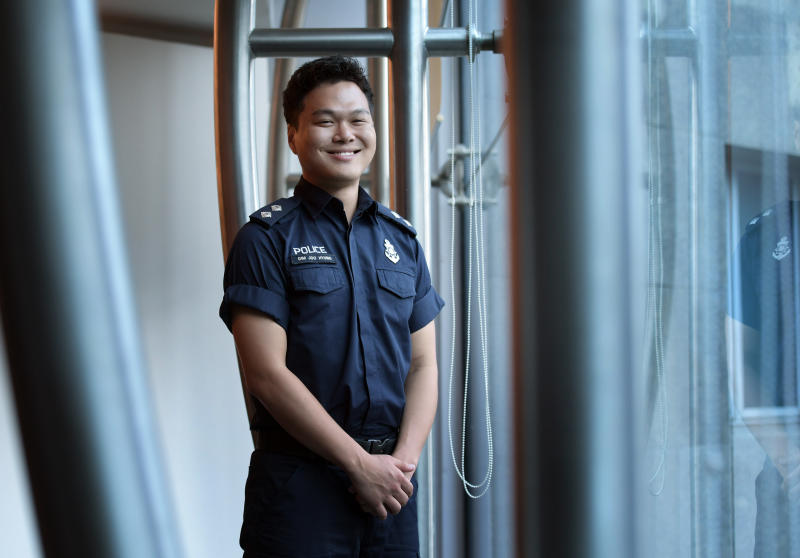Trump-Kim Summit: 'Come eat Pyongyang noodles' invite to Singapore interpreter
Sign up now: Get ST's newsletters delivered to your inbox

Inspector (NS) Gim Joo Hyung, an operationally-ready National Serviceman of the Police Coast Guard who helped liaise with the North Korean delegation.
ST PHOTO: ALPHONSUS CHERN
SINGAPORE - Born to South Korean parents and having spent most of his life in Singapore, undergraduate Gim Joo Hyung, 25, imagined North Koreans to be rough and inflexible.
However, his stereotypes were overturned after spending long hours with the North Korean delegation during the Trump-Kim Summit this week as the main interpreter on the ground for the Singapore Police Force.
Although he expected them to be rigid in their thinking given their military background, the North Koreans showed flexibility when it came to arrangements here, and were responsive and polite during interactions, said Inspector (NS) Gim, an operationally-ready National Serviceman of the Police Coast Guard.
Security is paramount for foreign delegates, and this requires a clear channel of communication between their security team and the police here, he added.
"It may be big, it may be small, it may be minute problems regarding the hotel, or maybe they have some discomforts that they want to surface. The first people that they look for are the police, because we are the direct liaison for them," he added.
He declined to give details of situations he handled, saying that they are "classified".
However, he recalls being pleasantly surprised towards the end of their time together.
"When everybody was leaving, I was quite happy that they shook my hand and thanked me - even those of very high ranks, because I was translating for them as well," he said. "It showed me that they are still human, they are still nice, and they are people who appreciate those hosting their leader."
With a laugh, he added: "They invited me to Pyongyang to eat Pyongyang noodles", referring to the cold buckwheat noodle dish the North Korean capital city is famous for.
He had received a call from the Police Coast Guard a week before the summit saying that they needed help from a Korean speaker. The call came not long after the banking and finance undergraduate in the Singapore Institute of Management-University of London completed his school examinations.
"At first I doubted myself. But my parents encouraged me to do it," said Mr Gim, a Singaporean permanent resident who speaks Korean at home. "No matter how much blood there has been between the North and the South, we share the same blood. I think (my mother) is a strong believer in that."
He moved to Singapore with his family when he was four.
He decided to take on the role, undergoing a 10-minute language proficiency test done over the phone by a third-party vendor. He had to answer a range of questions including translating lines like "You have been arrested in accordance to the Singaporean law".
Before he knew it, he was the police force's key interpreter, liaising with the North Korean security team.
It was a whirlwind experience: Getting used to the strong North Korean accent, learning senior officials' military ranks, and calling his mother for help with terminology.
"Where Chairman Kim went, I was there," said Mr Gim, referring to leader Kim Jong Un, whom he did not interact with directly.
He knew that he had won the North Korean security team's trust when officers on the ground - who generally do not speak with others as they are not in a position to make decisions - would go directly to him for help.
Mr Gim was one of many who helped to bridge the language gap. Another was Ministry of Communications and Information (MCI) senior manager Chen Jing Lin, 33, who recalls having to move around the International Media Centre to resolve urgent situations when South Korean media personnel needed help.
But work did not stop when she was "off-site". On the day of the summit, MCI officers needed the media to gather at 12pm, to move to Capella Singapore for President Donald Trump's press conference.
"I had to translate the message for the South Korean media over WhatsApp, so my colleagues could show it to them, and get them to the right place at the right time," she said.


